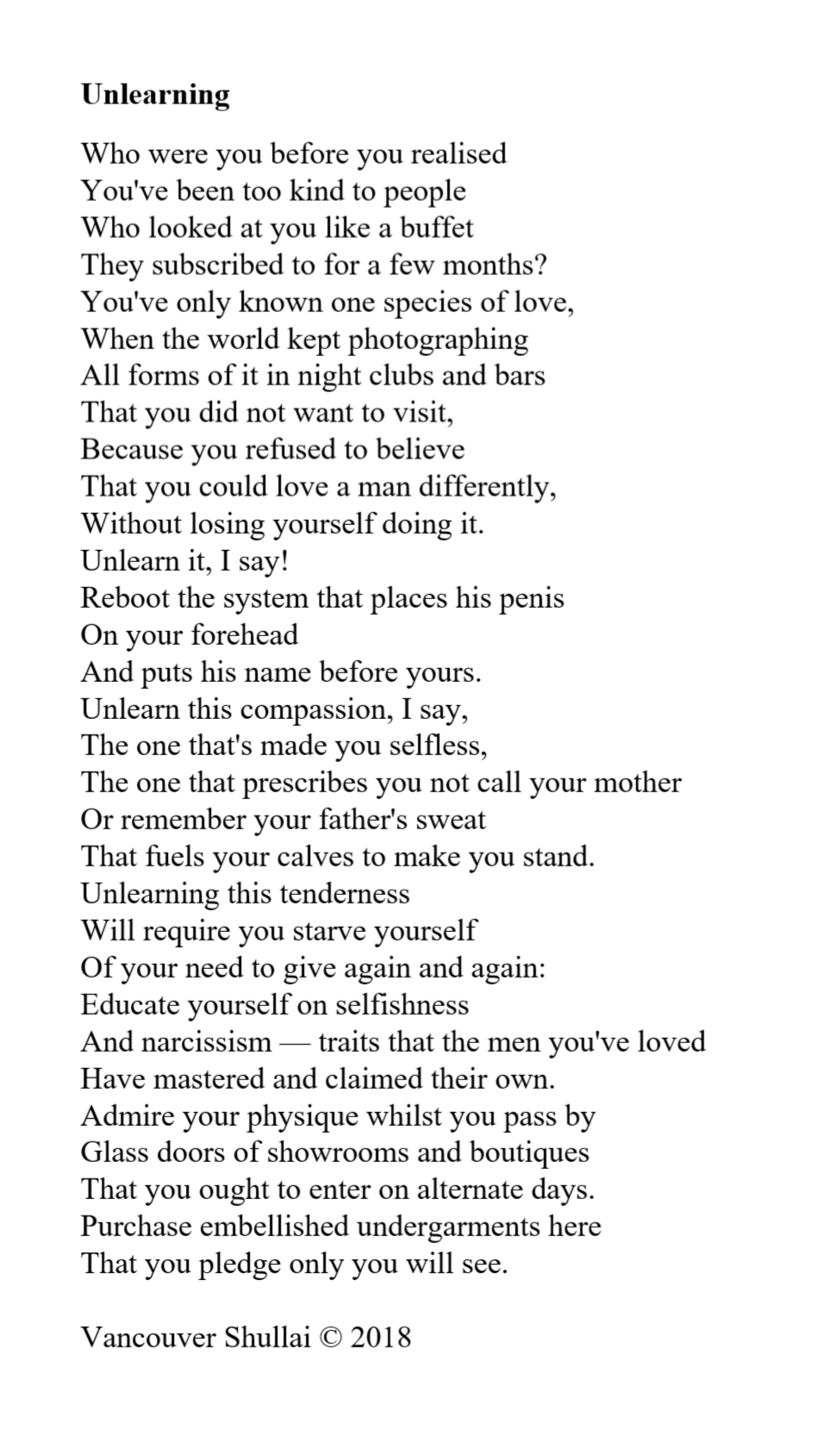At 23, Vancouver Shullai has published his book of poetry, won a national prize for his poetry and is already breaking out of the mold of traditional poetry-writing. Based in Shillong, he recently completed his masters in English from Bengaluru.
Talking to Vancouver Shullai is like taking a walk through his mind. Our conversation with him left us inspired, and wanting to indulge in his poetry. He says, ‘I really think that’s how art works, any form of art, be it music or paintings or films – the liberty to interpret that we as artists give our readers and spectators is in abundance’.
Join us for a conversation with the winner of the 2017 Wingword Poetry Prize, on the publication of his first book of poetry, “How To Love A Broken Man”.
Vancouver Shullai calls himself an artist, on a journey of constant change and improvement.
-
To start off, we’d like to congratulate you for the release of your book! Please share a bit about yourself with our readers.
Thank you! I’m Vancouver Shullai, 23 years old and a resident of Shillong. I recently completed my MA in English with Communication Studies from CHRIST, Bengaluru. People who know me say I’m really outgoing and fun to be around, but I don’t entirely agree. I dread a crowd and enjoy quiet places very much. My first love is music, I started singing long before I started writing, but writing has my heart now.
Vancouver Shullai acquired his Master’s degree from Christ University, Bengaluru.
-
Talking about your book, what’s it about and what do you want your readers to take away from it?
‘How To Love A Broken Man’ is a collection of fifty poems that I wrote between the years 2015 and 2017. What I want my readers to take away from the book is that my poems have a multitude of meanings within phrases or even words that contribute to the larger exposition of the poem. I want my readers to look at my poems as puzzles that require their intervention to piece together the nuances and make sense of the poem in a way that it relates to them.
I really think that’s how art works, any form of art, be it music or paintings or films – the liberty to interpret that we as artists give our readers and spectators is in abundance, so much so that it becomes a collective effort of the creator and the one it is created for to complete the artwork. I truly hope this liberty is remembered when my poems are being read.
-
When did you discover that writing was your passion?
I started writing when I was 16. I always had a very significant love for poetry and had written several little poems as a child. Although for a very long time, I maintained a reasonable distance from the titles of ‘writer’ or ‘poet’ because I felt like one had to achieve so much to earn that title. This is why I call myself an artist because I believe the term connotes to growth and a constant search for improvement. I’m a sucker for evolution, I absolutely detest complacency.
Vancouver is also a recipient of the 2010 National Child Award from the President of India, for his ‘exceptional ability in singing’
-
What do you enjoy writing about? How would you introduce your poetry to us?
I’m not very sure how I can introduce you to my poetry per se, but if I had to describe my art in a few words, I’d say it is authentic, sincere, and at times, brutal.
My poetry is, more often than not, a protest. There are poems that bring in a feel of the Romantics; they’re a lot like tea breaks from resentment. I hold every poem in equal regard because each of them comes from a place of extremely pure inspiration. To put it simply, I don’t force my poetry. If I feel it, I write it. If I don’t, I don’t.
-
Growing up in Shillong, do you think your roots have influenced your art in some way?
My interest in writing came from the desire to create something that I could never find in English school textbooks. I was stunned when I came across the very honest work of Kamala Das. The nonchalance and strong disregard for people’s opinions that shone brightly in her poetry left me wanting to write something of the same tone. So I did.
My roots strongly fuel my work in many ways. I love my culture and tradition as much as I respect and admire other cultures. One aspect of my culture that I often incorporate in my work is language.
I take phrases in Khasi and insert them into poetry; these are more than just decorative pieces, they’re a reminder that I, as an artist, belong to a unique heritage. There’s great beauty in accepting and knowing your roots.
My poem “Modern Man” speaks exactly about that. The inspiration that my culture provides emerges from both my agreement and disagreement with its beliefs. I think it’s very healthy to maintain a balance between contention and appreciation. My poetry does both.
Vancouver’s poem, ‘The Wait’ which won the Wingword Poetry Prize in 2017
-
What’s your creative process like? What’s your favorite time to write?
I don’t have to manage or find time to write poetry because there’s no such thing. I don’t set aside an hour or less a day to just write poetry, that doesn’t work for me. I write when inspiration hits, when I’m overwhelmed and that doesn’t happen every day or at a particular time of day. I wrote “The Wait” in an Uber after a long day of travel, I remember stinking of sweat and dying to bathe. That’s how it works for me; sometimes I write two poems a day and other times, I don’t write anything for months.
-
Where do you draw inspiration from for your poetry?
I wish I could name the themes that my poetry abides by. They’re quite erratic and I don’t know if that’s a good thing or not. I’m constantly inspired by something new every day. Although you could say as I mentioned earlier that my poetry is a protest with tea breaks in between. My style, however, is a constant departure from this to that.
- What are your plans for the future?
For the future, I plan to venture into prose-like poetry and even fiction, if inspiration permits. I really wouldn’t want to restrict myself to the traditional structure of a poem, poetry is so much more than that. Say, if you can look at the sky and take notice of its cloudlessness as if your breaths are deeper now than when it is cloudy, you have already written a poem with your heart.
Get your copy of “How To Love A Broken Man” on Amazon.
- ‘My Followers Inspired Me to Publish My First Book’ – Rodingpuii, a Self-Published Poet from Mizoram - September 24, 2019
- Asenla Jamir from Nagaland Chats About Her Fashion Journey and Also Catch Her in the Upcoming Movie “Axone” by Nicholas Kharghongar - September 18, 2019
- Raktim Gautam from Guwahati, a Spoken Word Poet and a Storyteller Carving His Own Way Through Words. - September 10, 2019







